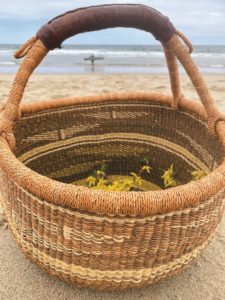WELLFLEET — The messages and phone calls came in all day. People asking, “Are you OK? I heard something happened at Lecount’s.” Messages and calls went out, asking the same question of others.
Earlier that morning, Martin Mackey, a man from Maine who had come down to the Cape to surf with his young son, had died at Lecount Hollow.
A few days later, another message arrived. A paddle out was being planned: “I hope you can make it. Please spread the word.”
That Sunday morning was cold and gray. The wind blew in from the northeast. Damp air full of sea water. People stood on the beach in wetsuits, 25 boards lay on the sand, a basket of flowers picked that morning next to them. Petals scattered in the wind.

There were clusters of pink and purple hyacinth and buttery yellow daffodils and bright forsythia. I chose a purple hyacinth and tucked the flower into the seam of my wetsuit. Diego Vas picked a sprig of forsythia and did the same thing. We all wore flowers.
At a moment that arrived all on its own, boards were picked up and carried to the water. As I walked out, I saw people marching out over the sandbar, already in waist-deep water. There were many different faces, colorful boards, and black wetsuits, all moving together against the push of the ocean, headed out toward the horizon. Paddling out to find togetherness in the face of separation.
A loose circle of boards formed out past the waves, the people on them rising and dipping with the swells. As I paddled closer, a feeling of immense gratitude warmed me. It is good to be among people who pull together at times of loss, who sit with one another in the water to honor a fellow surfer. I felt my throat tighten. Salt water and tears taste the same.
The paddle out is a ritual held by surfers and water-people everywhere. It is an act of community, togetherness, strength, and connection, held anytime those most important of human virtues are needed.
Paddle outs are held in protest, in memory of, in honor of, and to say goodbye. There are paddle outs made up of hundreds of surfers to protest waves under threat from development or quiet ones held for lost friends and family. The paddle out completes the circle when a link has gone missing or needs reinforcing.
Out past the waves, when surfers form a circle, it is the shape of unity, completeness, strength. The hands of those beside you — whether strangers or friends — are held in your own. Flowers are nearly always a part of this ritual. Fleeting gifts of beauty and life are brought from the land, a thing that does not belong in the sea, cast into the middle of the circle, given over to the ocean.
When the soul feels loss, when big feelings arise, when fear is present, we seek to be held. We run to the arms of family and friends. The paddle out is that. It is togetherness. And so, the dangers of the world are softened.
As far as I know, no one at the paddle out knew Martin. That didn’t matter. He was someone who loved the ocean. A person who knew the thrill and quiet that playing in the ocean brings. A link in the circle.
Handfuls of flowers, raised in cold, cupped fingers, floated toward the sky, then rained down on the water in a spray of yellows, purples, and pinks. It was a letting go, a celebration, a thank you, and a goodbye. The circle broke apart as one surfer caught a wave. And then everyone surfed. Together. Around us, the flowers, swirling in the salt water and foam, little hints of vibrant color, were like topical fish just beneath the surface.



